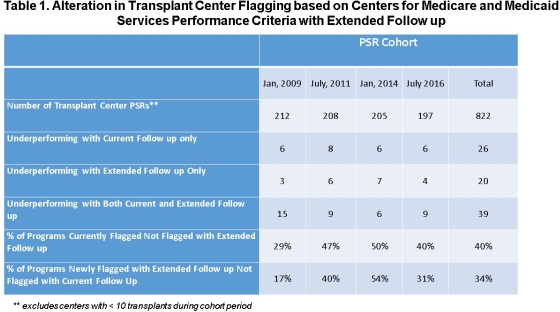Significant Alteration in Transplant Center Performance Assessment with Extended Patient Follow Up Time
Cleveland Clinic, Cleveland.
Meeting: 2018 American Transplant Congress
Abstract number: 477
Keywords: Graft survival, Outcome, Survival
Session Information
Session Name: Concurrent Session: Non-Organ Specific: Economics, Public Policy, Allocation, Ethics - 2
Session Type: Concurrent Session
Date: Tuesday, June 5, 2018
Session Time: 2:30pm-4:00pm
 Presentation Time: 3:18pm-3:30pm
Presentation Time: 3:18pm-3:30pm
Location: Room 4C-4
Introduction
Current transplant center performance models focus on 1-year graft and patient survival as primary outcomes. This is despite that 2.5 year cohorts are used to generate models and as such 2.5 year follow up is available for evaluation using standard statistical models. Moreover, a clear challenge with current assessment is very modest clinical relevance of differences between “good” and “bad” center performance given high expected 1-year survival.
Methods.
We evaluated all US adult kidney transplant centers using the SRTR and retrospectively simulated performance models over four independent cohorts(2009-2016) using standard risk adjustment but incorporating 2.5 year follow up for graft and patient survival rather than administrative censoring at 1-year. We evaluated changes in performance evaluations(using CMS criteria) and differences in observed and expected survival among performance groups.
Results
Over four periods and 822 transplant center cohorts, 39 cohorts were flagged using 1-year and 2.5-year follow up for graft or patient survival. However, 26 cohorts were flagged with 1-year but not 2.5 year follow up and 20 programs were flagged with 2.5 year but not 1-year follow up. Overall 40% of programs currently flagged for 1-year outcomes would not meet CMS flagging criteria with extended follow up.  Differences in observed and expected graft and patient survival were significantly higher(p<0.01 for both) for centers underperforming with 2.5 versus 1-year follow up.
Differences in observed and expected graft and patient survival were significantly higher(p<0.01 for both) for centers underperforming with 2.5 versus 1-year follow up.
Conclusion
Results indicate that post-transplant center performance evaluations are significantly altered incorporating extended follow up using existing cohort definitions and timelines. Findings indicate that 1-year outcomes are not a good proxy for even intermediate post-transplant follow up and suggest performance based on one-year outcomes does not reliably translate to longer-term outcomes for patients. Extended follow up identifies performance differences that are more clinically relevant and less subject to random variation. Further modification of performance models may be required to capture the actual quality of centers and identify clinically relevant differences.
CITATION INFORMATION: Schold J., Goldfarb D., Flechner S., Wee A., Poggio E. Significant Alteration in Transplant Center Performance Assessment with Extended Patient Follow Up Time Am J Transplant. 2017;17 (suppl 3).
To cite this abstract in AMA style:
Schold J, Goldfarb D, Flechner S, Wee A, Poggio E. Significant Alteration in Transplant Center Performance Assessment with Extended Patient Follow Up Time [abstract]. https://atcmeetingabstracts.com/abstract/significant-alteration-in-transplant-center-performance-assessment-with-extended-patient-follow-up-time/. Accessed December 28, 2025.« Back to 2018 American Transplant Congress
